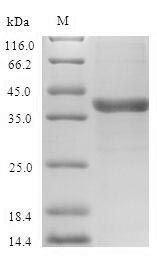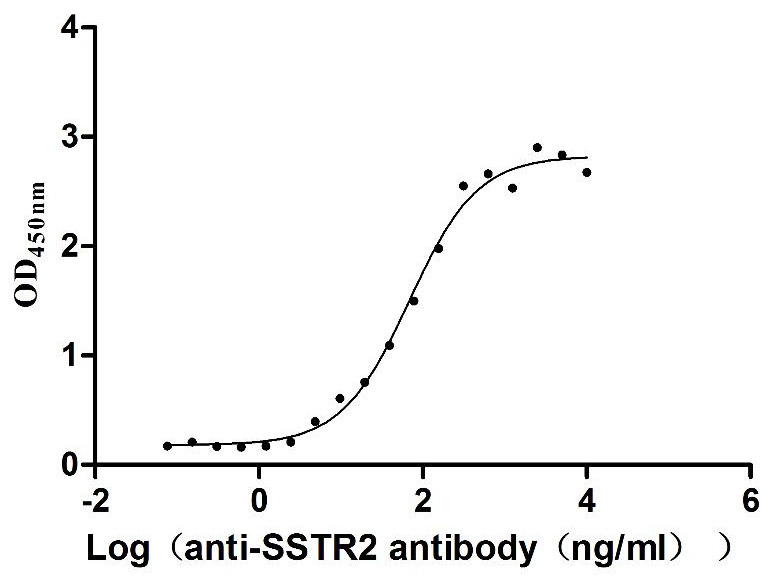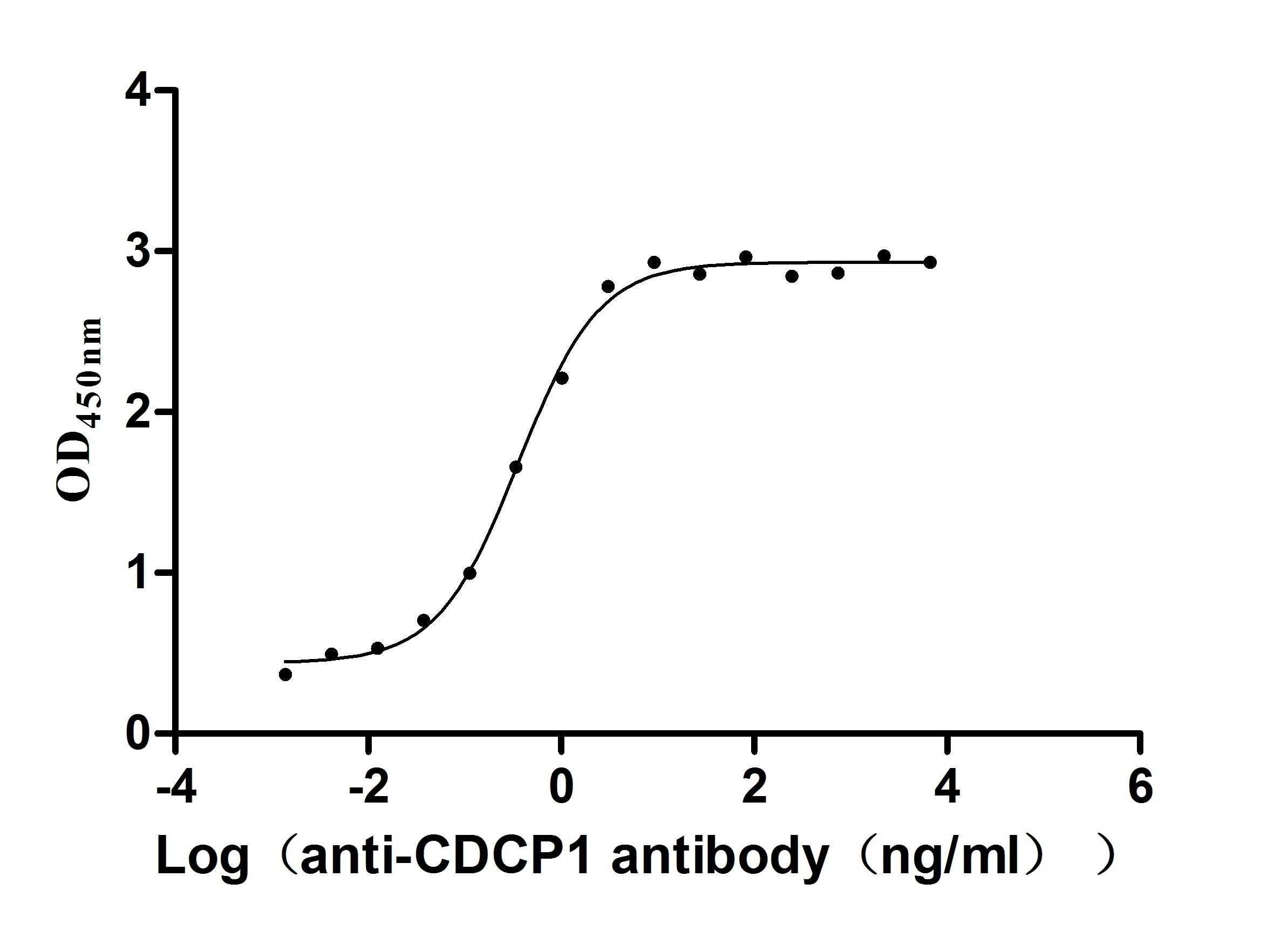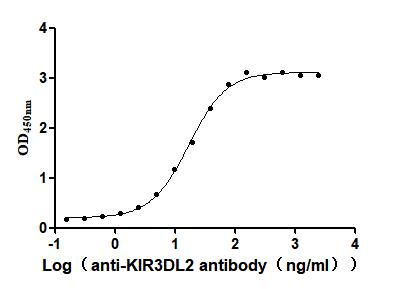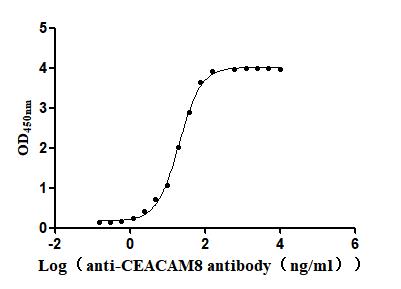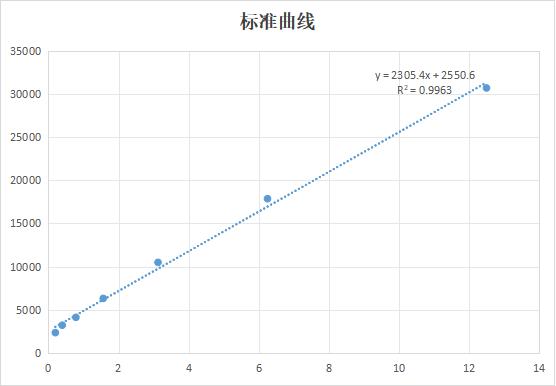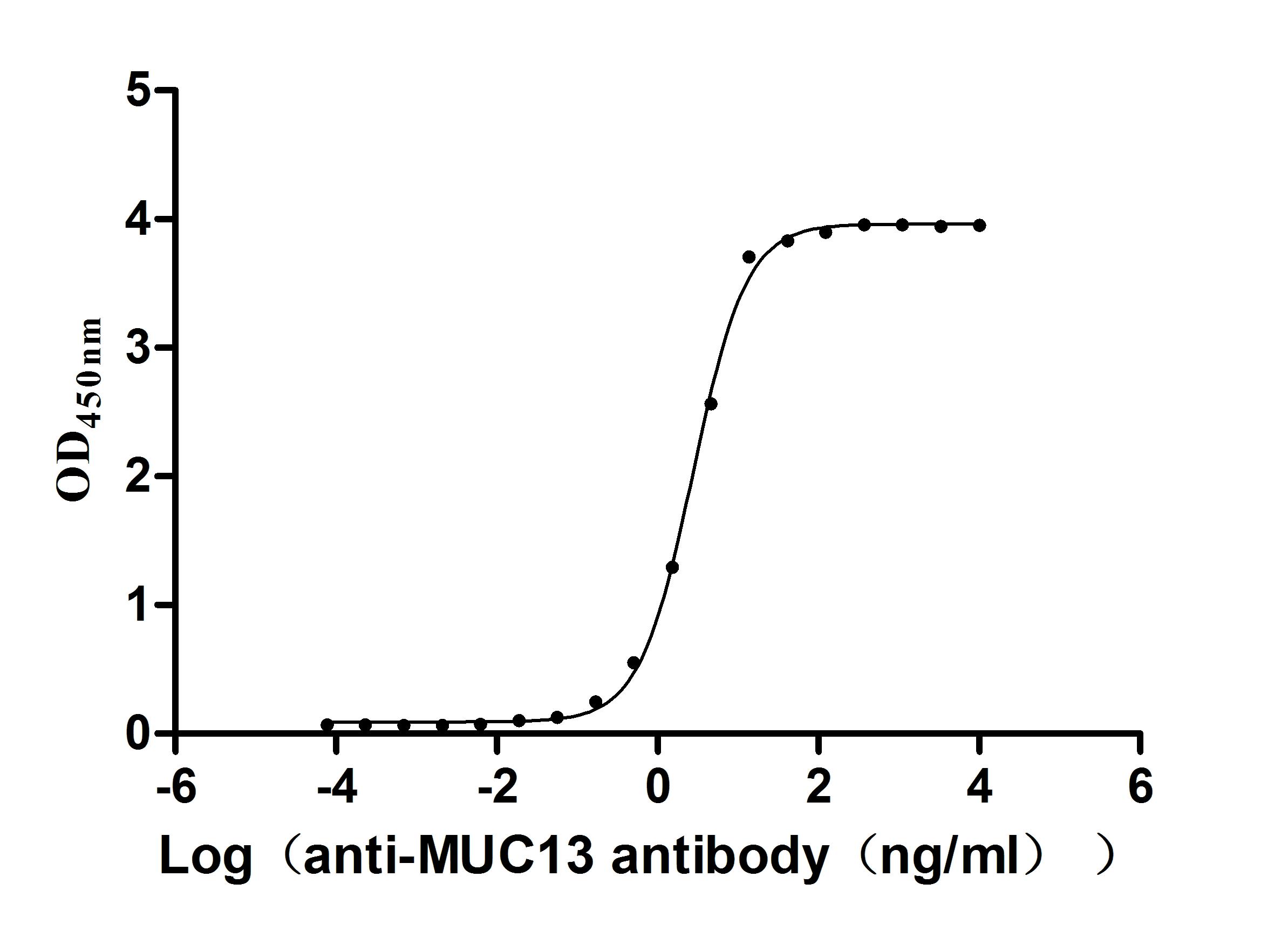Recombinant Human Vascular endothelial growth factor C (VEGFC)
In Stock-
货号:CSB-EP025835HU
-
规格:¥1344
-
图片:
-
其他:
产品详情
-
纯度:Greater than 90% as determined by SDS-PAGE.
-
基因名:
-
Uniprot No.:
-
别名:Flt 4L; Flt4 ligand; FLT4 ligand DHM; Flt4-L; Flt4L; Vascular endothelial growth factor C; Vascular endothelial growth factor related protein; Vascular endothelial growth factor-related protein; VEGF C; VEGF-C; Vegfc; VEGFC_HUMAN; VRP
-
种属:Homo sapiens (Human)
-
蛋白长度:Full Length of Mature Protein
-
来源:E.coli
-
分子量:40.1kDa
-
表达区域:112-227aa
-
氨基酸序列AHYNTEILKSIDNEWRKTQCMPREVCIDVGKEFGVATNTFFKPPCVSVYRCGGCCNSEGLQCMNTSTSYLSKTLFEITVPLSQGPKPVTISFANHTSCRCMSKLDVYRQVHSIIRR
Note: The complete sequence including tag sequence, target protein sequence and linker sequence could be provided upon request. -
蛋白标签:N-terminal GST-tagged
-
产品提供形式:Liquid or Lyophilized powder
Note: We will preferentially ship the format that we have in stock, however, if you have any special requirement for the format, please remark your requirement when placing the order, we will prepare according to your demand. -
缓冲液:Tris-based buffer,50% glycerol
-
储存条件:Store at -20°C/-80°C upon receipt, aliquoting is necessary for mutiple use. Avoid repeated freeze-thaw cycles.
-
保质期:The shelf life is related to many factors, storage state, buffer ingredients, storage temperature and the stability of the protein itself.
Generally, the shelf life of liquid form is 6 months at -20°C/-80°C. The shelf life of lyophilized form is 12 months at -20°C/-80°C. -
货期:3-7 business days
-
注意事项:Repeated freezing and thawing is not recommended. Store working aliquots at 4°C for up to one week.
-
Datasheet & COA:Please contact us to get it.
相关产品
靶点详情
-
功能:Growth factor active in angiogenesis, and endothelial cell growth, stimulating their proliferation and migration and also has effects on the permeability of blood vessels. May function in angiogenesis of the venous and lymphatic vascular systems during embryogenesis, and also in the maintenance of differentiated lymphatic endothelium in adults. Binds and activates KDR/VEGFR2 and FLT4/VEGFR3 receptors.
-
基因功能参考文献:
- A possible mechanism has been proposed of the TGF-beta-VEGF-C pathway in which TGF-beta promotes VEGF-C production in tubular epithelial cells, macrophages, and mesothelial cells, leading to lymphangiogenesis in renal and peritoneal fibrosis. (Review) PMID: 30142879
- The mutation induced skipping of exon 2 of VEGFC resulting in a frameshift and the introduction of a premature stop codon (p.Ala50ValfsTer18). The mutation leads to a loss of the entire VEGF-homology domain and the C-terminus. PMID: 30071673
- VEGFR-3 and CAV3 expression demonstrated immunohistochemically in SMCs of the tunica media of SV grafts predicted their early restenosis in triple-vessel CAD patients. CAV2 protein expression in SMCs of ITA grafts indicated the risk of early graft failure both in double-vessel and triple-vessel CAD subjects. PMID: 29557990
- VEGF-C expression and secretion in gastric cancer is downregulated by kallistatin. PMID: 29243194
- Concomitant high expression of survivin and VEGF-C is closely associated with LNM status of PTC patients, which suggests their cooperation in the metastatic process. PMID: 29578160
- TNFSF15, a cytokine mainly produced by blood endothelial cells, facilitates tumor lymphangiogenesis by upregulating VEGFC expression in A549 cells. PMID: 29890027
- serum levels not elevated in patients with erythrodermic mycosis fungoides/Sezary syndrome PMID: 28925057
- SPARC expression was inversely associated with the degree of malignancy and it had a negative correlation with VEGF-C and VEGF-D expression. Results suggest SPARC might function as a tumor suppressor inhibiting angiogenesis and lymphangiogenesis in ovarian cancer by reducing the expression of VEGF-C and VEGF-D. PMID: 29075785
- VEGF-A/VEGF-C analysis showed higher positivity in metastatic nodes and higher positivity in the surrounding negative nodes from positive cases in comparison with nonmetastatic patients. PMID: 28984690
- this study shows that decidual NK cells facilitate the interaction between trophoblastic and endothelial cells via VEGF-C and HGF PMID: 28653669
- Lymphangiogenesis during tubulointerstitial fibrosis to be associated with increased expression of CTGF and VEGF-C in human obstructed nephropathy as well as in diabetic kidney disease. vitro, CTGF induced VEGF-C production in HK-2 cells, while CTGF siRNA suppressed transforming growth factor beta1-induced VEGF-C upregulation. PMID: 28545716
- study is the first to describe the mechanism of leptin-promoted lymphangiogenesis by upregulating VEGF-C expression in chondrosarcomas. PMID: 27345723
- Retroperitoneal tumour progression in EOC patients is associated with high VEGF-C expression. PMID: 28591727
- Mechanistic investigations indicated that BDNF facilitated VEGF-C-dependent lymphangiogenesis through the MEK/ERK/mTOR signaling pathway. PMID: 28771226
- Results has shown that VEGF-C was highly expressed in non-small cell lung cancer (NSCLC) tissues and metastatic lymph nodes. VEGF-C expression levels was significantly correlated with lymph node metastasis in NSCLC. Along with CXCR4, VEGF-C might synergically promote lymphatic metastasis in lung cancer and might be a clinical predictor of lymph node metastasis in NSCLC patients. PMID: 28925100
- CXCR4, CCR7, VEGF-C and VEGF-D expression might have synergistic effects on the lymph node metastasis in patients with cervical cancer. PMID: 28535405
- prolactin induction of VEGF-C and Runx2 was inhibited partly by Carboxypeptidase-D inhibitors, implicating nitric oxide , produced by PRL-regulated Carboxypeptidase-D, in breast cancer progression PMID: 28364216
- Study is the first to describe the mechanism of bFGF-promoted lymphangiogenesis by upregulating VEGF-C expression in chondrosarcomas. PMID: 27229532
- eIF4E promoted cholangiocarcinoma cell metastasis by up-regulating the expression of VEGF-C, MMP-2 and suppressing E-cadherin expression. PMID: 27907907
- High expression of VEGF-C in the primary tumour may be a good determinant for detection of occult tumour cells in the lymph nodes of OSCC cases. PMID: 27417330
- document for the first time that CCL5 induces tumor lymphangiogenesis by the induction of VEGF-C in human cancer cells. PMID: 27166194
- Data suggest that the BRG1/STAT3/VEGFC in tumor-associated lymphangiogenesis might lead to the discovery of novel therapeutic targets in the treatment of cancers with BRG1 loss of function. PMID: 27145366
- Studied the effect of recombinant human vascular endothelial growth factor (VEGF)-C on lymphangiogenesis, inflammation, and fibrosis in the mouse kidney using the unilateral ureteral obstruction (UUO); lymphangiogenesis was significantly induced in the UUO+VEGF-C group. In lymphatic endothelial cells, VEGF-C increased the activity and proliferation of such cells and expression of VCAM-1. PMID: 29083411
- This study reports that human dendritic cells produce VEGF-C, a cytokine with potent pro-lymphangiogenic activity when stimulated with IFN-gamma PMID: 26987844
- Association of coexpressed high levels of VEGF-C and active MMP-9 with lymphatic spreading and local invasiveness of Papillary thyroid carcinoma (PTC) suggests their potential usefulness as predictive biomarkers of aggressive PTC behavior. PMID: 27806941
- Data show that VEGF-C, VEGF-D, and VEGFR-3 were expressed in a substantial percentage of breast carcinomas. PMID: 28791841
- By treating LECs with VEGF-C156S and analyzing subsequent changes in gene expression, we identified several 'immediate early' transcription factors that showed a rapid transient upregulation VEGFR-3 stimulation. these results reveal an important and unanticipated role of HOXD10 in the regulation of VEGFR-3 signaling in lymphatic endothelial cells, and in the control of lymphangiogenesis and permeability. PMID: 27199372
- In colon cancer samples, there was a positive correlation between the expression of integrin alpha4 and VEGF-C. Integrin alpha4 and VEGF-C were significantly associated with the clinicopathological parameters (LMVD, Duke's stage, and lymph node metastasis). patients with high integrin alpha4 or VEGF-C expression had significantly shorter overall survival and tumor-free survival time. PMID: 26917449
- High VEGFC expression is associated with angiogenesis and lymphangiogenesis. PMID: 27852824
- Adiponectin promoted VEGF-C expression and secretion in human chondrosarcoma cells. PMID: 27252405
- Study showed that VEGF-C levels are high in hypervolemic and low in euvolemic (and hypovolemic) chronic kidney disease patients; serum VEGF-C levels were significantly correlated with bioimpedance spectroscopy measurements PMID: 28471955
- Taken together, we suggest that ELK3 is an upstream regulator of the NF-kappaB signaling pathway, the inhibition of which leads to the suppression of peritumoral lymphatic vessel development, possibly due to a low VEGFC expression. PMID: 28188790
- These results indicate that VEGF-C-induced MSC osteogenesis is mediated through VEGFR2 and VEGFR3, and followed the activation of the ERK/RUNX2 signaling pathway. PMID: 28163024
- Overexpression of vascular endothelial growth factor C (VEGF-C) in Kazakh esophageal squamous cell carcinoma (ESCC) was significantly associated with gender, depth of tumor invasion, lymph node metastasis and tumor clinical stage. PMID: 27939650
- This paper quantifies the lymphatic microvessel density (LMD) in benign and malignant salivary gland tumors and analyzes the relationship between LMD and tumor expression of vascular endothelial growth factors C (VEGF-C) and the proliferative index. PMID: 27229879
- KAI1-induced decreases in VEGFC expression are mediated via Src/STAT3 signaling pathways in pancreatic cancer cells. PMID: 27082851
- The results of this study suggest that the more aggressive biological behavior of squamous cell carcinoma of the tongue in young patients may be related to a higher expression of VEGF-C. PMID: 27876236
- This study suggests that NRP1 expression and LVD are independent factors that are likely to predict the risk of LN metastasis in squamous cell carcinoma (SCC)of the tongue, whereas the expression of VEGFC, VEGFR3, CCR7, and SEMA3E are nonindependent predictive factors PMID: 27666723
- High expression of VEGFC is associated with peritoneal dissemination in gastric cancer. PMID: 26621525
- TNF-alpha mediates VEGF-C expression, which plays a critical role in the pathogenesis of pterygia. PMID: 27314284
- a potential link between the upregulation of Syk and VEGF-C expression and lung adenocarcinoma. PMID: 27461624
- The summarizes the structure and function features of pathway-related molecules of VEGFC/D-VEGFR3/NRP2 axis, stages of various tumors and their molecular mechanisms and significances in tuthe expression changes of these molecules in different anatomic organs or histopathologic types or development lymphatic metastasis. PMID: 27527412
- Data show that WNT1-inducible signaling pathway protein-1 (WISP)-1/CCN4 expression was correlated with vascular endothelial growth factor-C (VEGF-C) expression in Oral squamous cell carcinoma (OSCC) specimens. PMID: 26824419
- VEGF-C overexpression shows an unfavorable prognosis for EC patients. PMID: 27540974
- FIGO stage (P < 0.0001), tumor grade (P < 0.0001), lymph node metastasis (P < 0.0001), serum VEGF-C concentration (P = 0.0001), and ascites VEGF-C concentration (P < 0.0001) were significantly correlated with overall survival in ovarian cancer. PMID: 23473018
- Our data suggested that IL-6 mediates the singnal pathway of JAK-STAT3-VEGF-C promoting the growth, invasion and lymphangiogenesis in gastric cancer PMID: 26750536
- The most extensively accepted signaling pathways promoting lymphangiogenesis in tumors include the secreted lymphangiogenic proteins: VEGF-C and VEGF-D, and their cognate receptor on lymphatic endothelium VEGF receptor-3 (VEGFR-3). PMID: 26706909
- the concurrent high expression of VEGF-C and NRP2 is predictive of the unfavorable prognosis in glioblastoma. PMID: 26753562
- a significant decrease in miR101 levels, accompanied with an increased expression of vascular endothelial growth factor (VEGF)C in cisplatinresistant SGC7901 gastric cancer cells. PMID: 26573417
- MTA1 is up-regulated in CRC; its expression is inversely associated with lymphatic metastases and the expression of VEGFC, VEGFD and VEGFR3 PMID: 26543080
显示更多
收起更多
-
相关疾病:Lymphedema, hereditary, 1D (LMPH1D)
-
亚细胞定位:Secreted.
-
蛋白家族:PDGF/VEGF growth factor family
-
组织特异性:Spleen, lymph node, thymus, appendix, bone marrow, heart, placenta, ovary, skeletal muscle, prostate, testis, colon and small intestine and fetal liver, lung and kidney, but not in peripheral blood lymphocyte.
-
数据库链接:
HGNC: 12682
OMIM: 601528
KEGG: hsa:7424
STRING: 9606.ENSP00000280193
UniGene: Hs.435215
Most popular with customers
-
Recombinant Human Somatostatin receptor type 2 (SSTR2)-VLPs (Active)
Express system: Mammalian cell
Species: Homo sapiens (Human)
-
Recombinant Human CUB domain-containing protein 1 (CDCP1), partial (Active)
Express system: Mammalian cell
Species: Homo sapiens (Human)
-
Recombinant Human Killer cell immunoglobulin-like receptor 3DL2 (KIR3DL2), partial (Active)
Express system: Mammalian cell
Species: Homo sapiens (Human)
-
Recombinant Human Carcinoembryonic antigen-related cell adhesion molecule 8(CEACAM8) (Active)
Express system: Mammalian cell
Species: Homo sapiens (Human)
-
Recombinant Human Urokinase-type plasminogen activator(PLAU) (Active)
Express system: Mammalian cell
Species: Homo sapiens (Human)
-
Recombinant Human Mucin-13(MUC13),partial (Active)
Express system: yeast
Species: Homo sapiens (Human)

